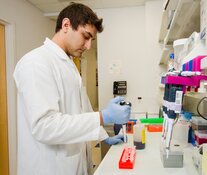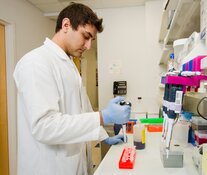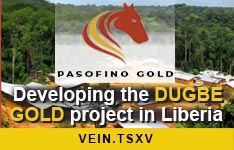Rakovina Therapeutics Inc. (RKV:TSX.V) announced new developments in its KT-5000AI program targeting ATR (ataxia telangiectasia and Rad3-related) inhibitors. These compounds are designed to interfere with DNA damage response pathways in cancer cells. The company reported that several synthesized molecules generated through its collaboration with Variational AI demonstrated strong ATR inhibition at nanomolar concentrations during early-stage screening.
According to the July 23 company news release, these results reflect the effectiveness of Rakovina's artificial intelligence–enabled approach to drug discovery. Dr. Mads Daugaard, President and Chief Scientific Officer, stated, “The progress we're seeing in the KT-5000AI program highlights the advantage of combining artificial intelligence with modern drug design.” The company is currently prioritizing its most promising candidates for further evaluation.
The development comes as the global ATR inhibitor market continues to grow, valued at approximately US$1.24 billion in 2024 and projected to reach over US$5.1 billion by 2033, according to Growth Markets Reports. The increasing demand for treatments that address DNA repair–deficient tumors has driven interest in ATR inhibitors. Rakovina's approach aims to create selective and potent molecules using AI-based screening platforms, including the Deep Docking and Enki technologies.
AI's Expanding Role in Oncology Reinforces the Value of Drug Discovery Platforms
Artificial intelligence (AI) is playing an increasingly important role in cancer care, supporting advancements in diagnostics, treatment planning, and research workflows. This broader integration aligns with Rakovina Therapeutics' AI-enabled strategy for developing targeted oncology treatments.
In a July 5 article published by Oncology, Dr. Julie M. Vose, MD, MBA, outlined how AI is being used across multiple stages of cancer care. She referenced tools like CHIEF, which achieved 96% accuracy in identifying various cancer subtypes using 15 million histopathology images. Dr. Vose noted that AI models capable of inferring tumor biology prior to molecular sequencing could aid in faster and more personalized treatment decisions. She also highlighted the usefulness of AI in summarizing patient data and matching individuals to clinical trials, while acknowledging the need for clear legal and privacy frameworks.
Additional evidence of AI's clinical utility was presented in a July 9 summary from Mount Sinai Hospital. The institution referenced a Nature Medicine study in which AI accurately identified EGFR gene mutations in lung adenocarcinoma using only routine pathology slides. Dr. Gabriele Campanella of the Icahn School of Medicine explained that this approach could conserve biopsy samples for further testing. In a real-time application at Memorial Sloan Kettering Cancer Center, the AI model ran alongside existing diagnostic procedures with consistent outcomes. Dr. Alexander Charney emphasized that the greatest long-term value may come from using AI to detect previously unrecognized biomarkers in standard clinical materials.
On July 10, The American Journal of Managed Care published commentary from Tennessee Oncology's "Tech Innovations in Community Oncology" forum, where panelists discussed the practical impact of AI in clinical settings. Dr. Lalan Wilfong suggested AI could help ensure comprehensive data is reviewed during care planning, while Dr. Ravi Parikh stressed the need for AI outputs to provide therapeutic direction rather than just probability estimates. Both noted current limitations in toxicity prediction due to incomplete real-world data, especially for milder adverse events. Despite these limitations, they agreed that AI, when paired with appropriate training, could support faster, data-driven decisions in oncology.
Insights presented by Dr. Arturo Loaiza-Bonilla during the 2025 ASCO Annual Meeting further reinforced the growing convergence of artificial intelligence and oncology. As reported by Target Oncology on July 23, the discussion of AI-powered pre-screening hubs and decentralized trial matching complements the technological advances reported by Rakovina Therapeutics. By leveraging next-generation sequencing and electronic health record interoperability through FIRE standards, Loaiza-Bonilla's approach aims to streamline biomarker testing and increase access to precision medicine — particularly in underserved areas. This mirrors Rakovina's focus on using AI platforms to rapidly identify and validate targeted cancer therapies. Both efforts reflect a broader industry shift toward scalable, data-driven oncology models designed to improve efficiency, inclusivity, and outcomes across the cancer care continuum.
Upcoming Milestones and Program Positioning
Rakovina Therapeutics has mapped a multi-stage drug development strategy centered around its AI-driven platform, according to its investor presentation. The KT-5000AI program is currently advancing through the drug refinement phase, with additional compound testing scheduled over the coming quarters. The company noted in its Q3 2025 investor presentation that data from its Variational AI collaboration will inform further refinement of ATR inhibitor candidates.
The KT-5000AI program complements Rakovina's broader focus on DNA damage response (DDR) therapies. The company screens billions of molecules through its AI partnerships to identify novel candidates for various oncology targets. Rakovina's integrated drug validation infrastructure, established in collaboration with the University of British Columbia, allows the company to confirm biological activity and prepare compounds for potential clinical advancement.
Management continues to highlight the potential of AI-based drug discovery to reduce development time and cost. With several DDR-related assets in development and ongoing partnerships aimed at advancing candidates to human trials, the KT-5000AI program represents a key component of Rakovina's strategic pipeline.
Analyst Coverage Highlights R&D Progress and Financial Position
On June 6, Dr. Douglas Loe, managing director and analyst at Leede Financial Inc., discussed Rakovina Therapeutics Inc.'s progress in his weekly review. He reported that the company had CA$100,000 in cash as of Q1/25 but noted that the amount was expected to increase with the near completion of a previously announced CA$4 million equity offering. According to Dr. Loe, this financing would likely support ongoing research and development activities tied to Rakovina's artificial intelligence–driven drug discovery efforts.
Dr. Loe stated that Rakovina's CA$900,000 R&D expense for the quarter appeared consistent with its current stage of development, particularly given its collaborations with the University of British Columbia and Variational AI. He noted that Rakovina was continuing to identify small molecules designed to simultaneously inhibit both PARP1 or PARP2 and other DNA mutation repair signaling targets. Among these targets, he specifically mentioned ATR, a kinase associated with the PI3K enzyme family, which is already the focus of approved therapeutics.
 Streetwise Ownership Overview*
Streetwise Ownership Overview*
Rakovina Therapeutics Inc. (RKV:TSX.V)
Ownership and Share Structure
Edison Oncology owns 12% of Rakovina Therapeutics.
Management and Reporting Insiders own 4%, with the top two being Jeffrey Bacha and Alfredo De Lucrezia.
The rest is friends/family and retail.
Rakovina Therapeutics recently announced a 10:1 share consolidation, effective on June 24, 2025.
This means that for every 10 pre-consolidation common shares, shareholders now hold one post-consolidation common share.
Rakovina Therapeutics Inc. has 21 million shares outstanding and a market capitalization of approximately CA$14.569 million. Over the past 52 weeks, its stock has traded between CA$0.40 and CA$2.30.
| Want to be the first to know about interesting Biotechnology / Pharmaceuticals investment ideas? Sign up to receive the FREE Streetwise Reports' newsletter. | Subscribe |
Important Disclosures:
- Rakovina Therapeutics has a consulting relationship with Street Smart an affiliate of Streetwise Reports. Street Smart Clients pay a monthly consulting fee between US$8,000 and US$20,000.
- As of the date of this article, officers and/or employees of Streetwise Reports LLC (including members of their household) own securities of Rakovina Therapeutics
- James Guttman wrote this article for Streetwise Reports LLC and provides services to Streetwise Reports as an employee.
- This article does not constitute investment advice and is not a solicitation for any investment. Streetwise Reports does not render general or specific investment advice and the information on Streetwise Reports should not be considered a recommendation to buy or sell any security. Each reader is encouraged to consult with his or her personal financial adviser and perform their own comprehensive investment research. By opening this page, each reader accepts and agrees to Streetwise Reports' terms of use and full legal disclaimer. Streetwise Reports does not endorse or recommend the business, products, services or securities of any company.
For additional disclosures, please click here.







































